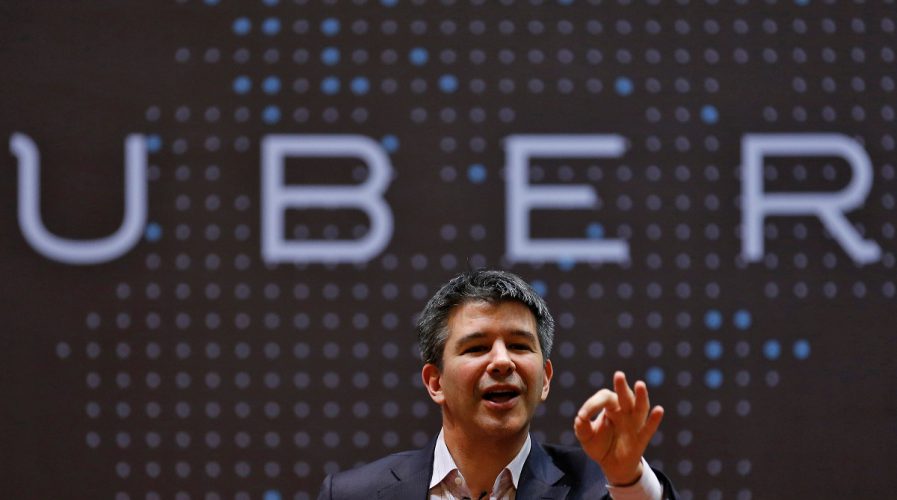
Kalanick speaks to students during a session at the Indian Institute of Technology (IIT) campus in Mumbai. Source: Reuters
Uber’s sexual harassment allegations are no surprise in the ‘bro-culture’ tech world
IN an industry as male-dominated as tech, it’s generally unsurprising to learn that certain companies have adopted bro-culture – otherwise known as the “boy’s club” mentality at work.
Ellen Pao, formerly of KPCB, was one of the most vocal women in Silicon Valley’s venture community that fought against such issues, while criticism of Uber’s bro-culture and mishandling of sexual harassment allegations against its drivers have persisted for years.
Following months of bad press including a leaked internal email and the company’s decision to apparently profit from a Trump-related taxi strike, the latest to hit the fan are sexual harassment allegations made within Uber’s engineering team. Former Uber engineer Susan Fowler Rigetti wrote an online essay claiming that she had been propositioned by another member of her team, but he was deemed “a high performer” by HR and so his actions went unpunished.
Devastating piece about what goes on at Uber's unrestrained, macho & often sexist headquarters. By @MikeIsaac https://t.co/X7pSXVnkFg pic.twitter.com/zUMNO0sZlb
— Steven Greenhouse (@greenhousenyt) February 23, 2017
CEO Travis Kalanick hosted an emergency “all hands on deck” meeting with board member Arianna Huffington and Uber’s new chief of HR Liane Hornsey to discuss the claims made in the blog, and to find the best way forward.
Based on the TechCrunch account of the meeting, there are a few things that don’t add up. The first was that Kalanick appeared to be “visibly upset” in the meeting and claimed to be “unaware” of any sexual allegations happening at Uber. Although a CEO of a large company may not be involved in day-to-day employee relations, claims of a “sexual harassment culture” should come as no surprise to Kalanick.
The second was of CTO Thuan Pham, who called Rigetti’s allegations “an utter failure” as he claimed that the company would never value high performance over an employee’s abuse. Still, Pham had allegedly threatened Rigetti with termination after she had shared what had happened with him.
Either way, it may be a case of “he said she said” but even the mightiest of companies will not be able to withstand the barrage of PR snafus that Uber has been subjected to. PR scandals are bad for recruitment, employee morale and ultimately a company’s bottom line.
if a wizard turned charlie sheen into a startup it would just be uber https://t.co/skw5rdefK8 pic.twitter.com/u83qQ7oZtY
— Kate Knibbs ? (@KateKnibbs) February 23, 2017
After the meeting, Huffington posted a release on Uber’s newsroom outlining plans to “build a better Uber.” Here is an excerpt:
“Travis spoke very honestly about the mistakes he’s made – and about how he wants to take the events of the last 48-hours to build a better Uber. It was great to see employees holding managers accountable. I also view it as my responsibility to hold the leadership team’s feet to the fire on this issue,” she said.
“Change doesn’t usually happen without a catalyst. I hope that by taking the time to understand what’s gone wrong and fixing it we can not only make Uber better but also contribute to improvements for women across the industry.”
However, many feel Uber’s response to the allegations are too little, too late. Even now, Uber faces a minimum of three lawsuits in at least two countries regarding sexual harassment or verbal abuse by managers, filed by former employees, reports the New York Times.
Uber must make a pointed decision to discipline and improve its team and work culture, which has been described as “aggressive” and “pugnacious”. If not, it risks not only losing out in the eyes of the consumer, but also driving away stellar female tech talent – a pool that will take its talents and potential elsewhere.
Additional reporting by Kate Ng
READ MORE
- Safer Automation: How Sophic and Firmus Succeeded in Malaysia with MDEC’s Support
- Privilege granted, not gained: Intelligent authorization for enhanced infrastructure productivity
- Low-Code produces the Proof-of-Possibilities
- New Wearables Enable Staff to Work Faster and Safer
- Experts weigh in on Oracle’s departure from adland
